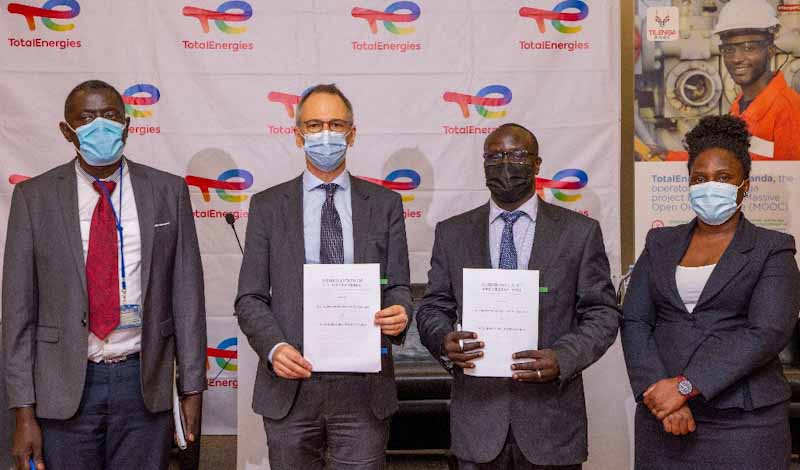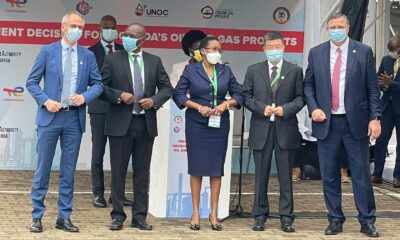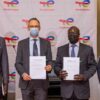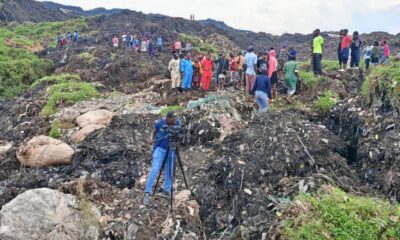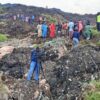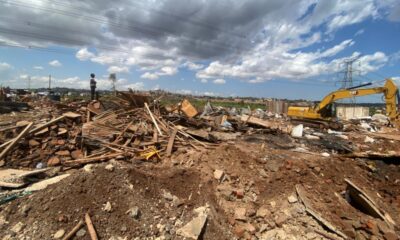Guest Writer
Uganda’s oil deal: Let’s face the brutal facts
A few weeks ago, I wrote a commentary in these pages about Uganda’s oil and its eminent fall in value by the year 2050. Of course, my unsettling prediction remains a “Maybe” and who knows, Uganda’s oil could flourish, boost our economy and push us further unto the development ladder even beyond 2050. Besides, similar predictions have been made about Russia and the Middle East’s oil market for over 100 years but have never materialized.
Like many Ugandans, I truly believe that this new oil deal, backed by the Final Investment Decision (FID) recently signed between Uganda and the Joint venture partners, will be a game-changer and a step in the right direction in the achievement of our economic development aspirations.
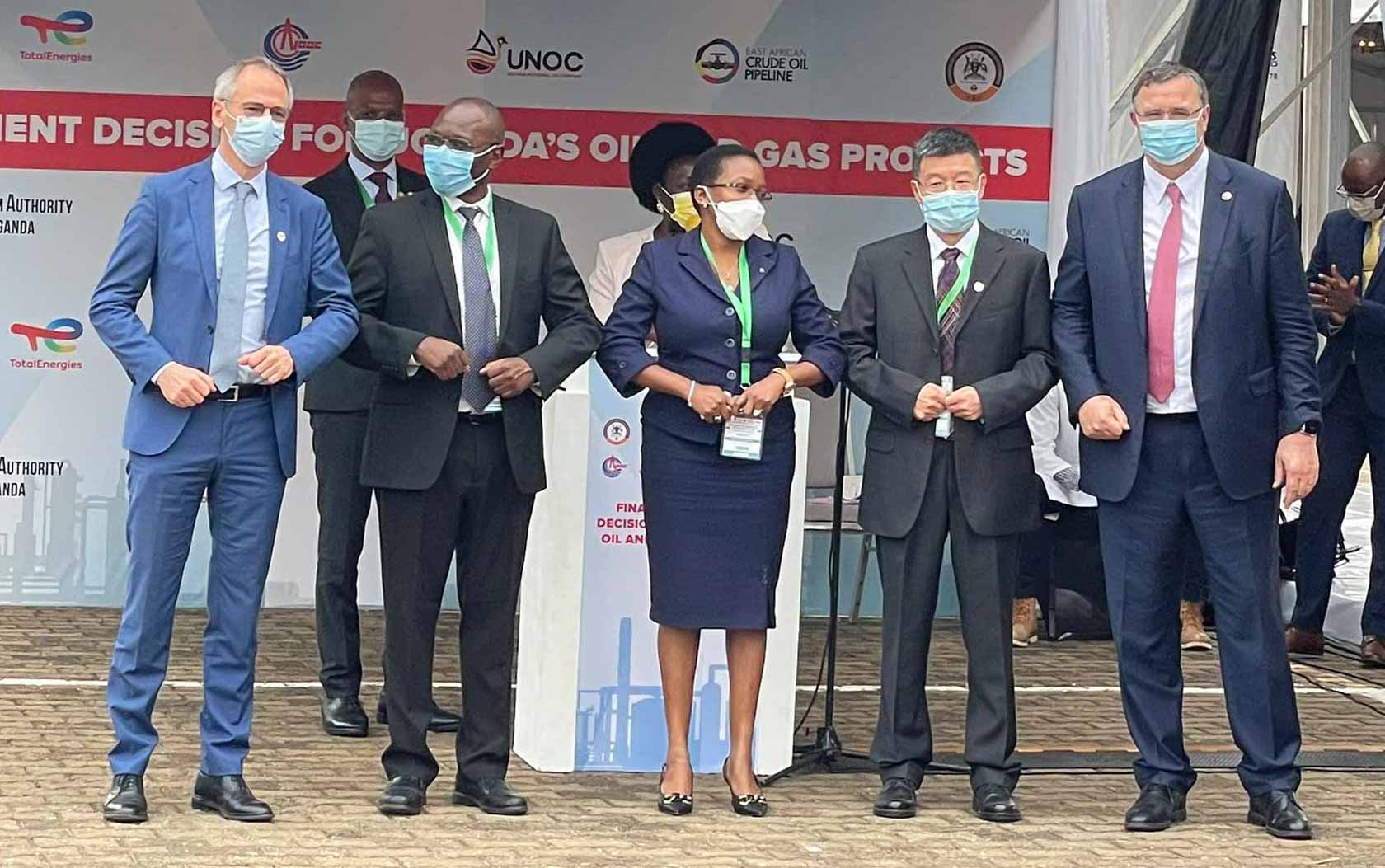
Total Energies CEO Poyane, right, shakes elbows with his CNOOC counterpart, and their Uganda National Oil Co. Boss Proscovia Nabbanja at the announcement of the FID
However, despite these confident assertions, Ugandans should be aware that if we are to derive any meaningful benefits from this oil deal, we need to be candid and confront some brutal, ugly facts. Our leaders need to look harder and ask: “What do we have to do or change in order to benefit from this deal as a country?”
In pursuit of that, I would expect us to start by examining the project itself. The Project, which will include the development of two oil fields on the shores of Lake Albert and the construction of a 1,445-kilometre East African Crude Oil Pipeline (EACOP), is estimated to require an investment of about $10 billion, with production anticipated to start in 2025.
But many questions, with few answers, have been raised regarding the source of financing for this $10 billion investment. This makes me skeptical because I am already aware that at least 11 international banks, three insurance companies and the African Development Bank have all ruled out supporting the project.
Our government should, therefore, probe this risk and engage the Joint venture partners regarding the same. Research indicates that this would not be the first project to reach a final investment decision without all the finances in place. A number of similar projects, such as the Lamu coal plant in Kenya, were subsequently cancelled.
Next question: What is in for the local contractors? The New Vision recently reported that only about 13 per cent of the entire oil cake for the Kingfisher Project (one of the projects under the FID) will be shared among local suppliers and contractors, with about 85 per cent expected to fly abroad, along with the foreign contractors.
If the same is translated to the other projects under the deal, then, I am afraid to say that the deal may not be worthwhile. Aspects of inadequate capacity and knowledge have been highlighted for this mishap but has the Petroleum Authority of Uganda conducted the required needs assessments to evaluate and develop local content?
Then come the monster of corruption: How can we talk about a project as large as this without considering corruption? In my opinion, Uganda has the tools – regulations and institutions – to fight corruption, but lacks the commitment and will to do so. And if there’s a slight change in our priorities towards combating corruption, without a single doubt, the results from this oil deal will be enormous for our country.
In countries such as Nigeria, Gabon, Angola and the Equatorial Guinea, the existence of oil has exacerbated corruption levels. And this has had devasting effects on these economies, in terms of economic and social development. In Nigeria, estimates indicate that more than $400 billion of oil money has been misused over the last 50 years.
But there are exceptions to this: countries such as Norway, Canada and Botswana have bucked the oil curse through strong state management and institutions that can stand against corruption.
According to John Ghazvinian, author of Untapped: The Scramble for Africa’s Oil, the flow of oil riches can also create bizarre contrasts. Luanda, the capital of Angola and also the centre of its oil industry, is just one example. Luxury high-rises have been built there despite the country’s extreme poverty, and oil companies are paying more than $15,000 a month to rent apartments for their employees.
For expatriates, “it’s one of the most expensive cities in the world,” he says. “The disparity between rich and poor there is like nowhere else in the world.” Oil companies are flocking to the country because its reserves lie offshore, allowing for safer drilling.
And how about the environmental concerns? The deal, especially EACOP, has come under intense scrutiny over what many environmentalists term as a total environmental breach. They argue that EACOP poses a multitude of risks – to communities, nature, wildlife and the climate.
It is further said that the project has already caused large-scale displacement of local communities and poses grave risks to protected environments, water sources and wetlands in both Uganda and Tanzania, including the Lake Victoria basin, which millions of people rely upon for drinking water and food production.
Among other cited dangers, environmentalists fear that it will rip through some of the world’s most important elephant, lion and chimpanzee nature reserves. There is also concern that the pipeline is a harbinger for the opening up of critical ecosystems, such as Murchison Falls National Park, to oil extraction.
Like I have said before, this oil deal presents our country with a great opportunity to finally make that leap into the middle-income category or even beyond. But it is upon our patriotic men and women in positions of power – government and alike – to confront the brutal facts and avoid the so-called ‘oil curse’. We are counting on you!
Mr. Mukalazi is the Country Director of
Every Child Ministries Uganda.
bmukalazi@ecmafrica.org
Comments



